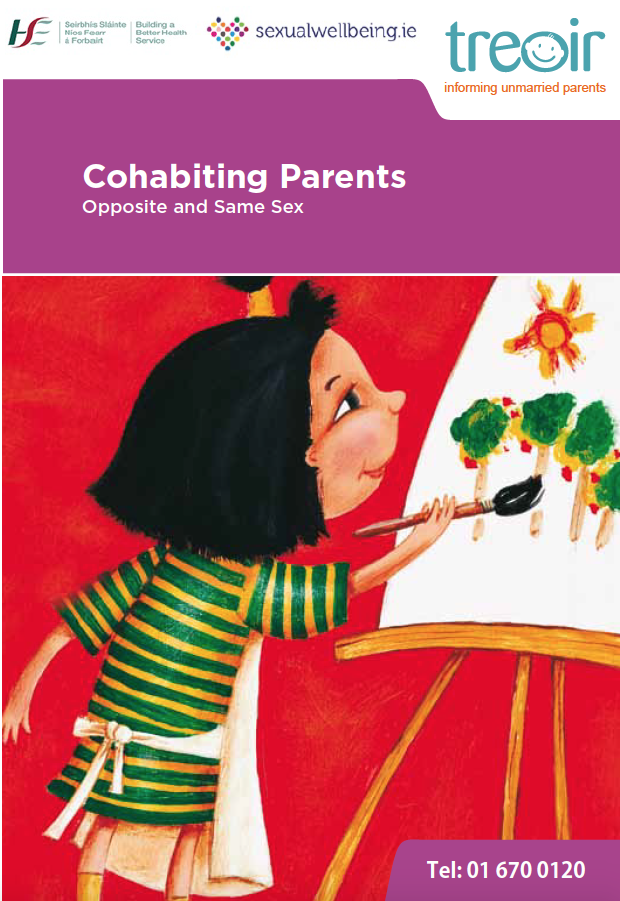Who are cohabitants?
Cohabitants are two opposite or same-sex adults who are:
- living together in an intimate and committed relationship
- not married to each other
- not in a registered civil partnership
- not related to each other.
Children of cohabiting parents
Children of cohabiting parents have the same succession and maintenance rights as children born to married parents.
Mothers
An unmarried mother has automatic guardianship and custody rights in respect of her child.
Fathers
An unmarried father does not have automatic legal rights in relation to his child. This applies even where the father has his name on his child’s birth certificate. See unmarried ‘fathers’. However, a father who is cohabiting with the mother continuously for twelve months and at least three of these months are after the birth of the child, will automatically be the guardian of his child. The three months period does not have to take place directly after the birth of the child. It can be fulfilled any time before the child turns 18 provided that it is part of the twelve consecutive months during which the parents have lived together. The cohabitation period can only be calculated going forward from the commencement date of the relevant section of the Children and Family Relationships Act 2015, 18th January 2016. This means that guardianship will only be acquired automatically where the parents live together for at least twelve months after the 18th of January 2016.
See here for more about Guardianship.

What is the Redress Scheme?
The Redress Scheme is a legal safety net for qualified cohabitantswho may otherwise be very vulnerable financially at the end of a relationship. Under this Scheme, a qualified cohabitant can apply to the court for a court order for compensatory maintenance, pension adjustment, property adjustment or provision from the estate of a deceased cohabitant. See below. The Redress Scheme applies only to those qualified cohabitants whose relationship ends after 1st January 2011, but the time spent cohabiting immediately before that is taken into account.
Who is a qualified cohabitant?
The Civil Partnership and Certain Rights and Obligations of Cohabitants Act 2010 came into effect on 1st January 2011. This Act introduced rights and obligations for qualified cohabitants under the Redress Scheme.
A qualified cohabitant is an adult who has been cohabiting –
- for at least 5 years or 2 years if you have a child with your partner, and
- are financially dependent on the other cohabitant.
Where one of the cohabitants is still married, neither of the cohabitants will be considered a qualified cohabitant unless the married cohabitant has lived apart from his/her spouse for at least 4 of the previous 5 years.
Cohabitants’ Agreements
Cohabitants can make a Cohabitants’ Agreement to regulate joint money matters during their relationship and for when their relationship ends. This agreement will be recognised as valid and enforceable. The agreement can include a full or partial opt-out of the redress scheme. Both cohabitants must get legal advice before making an agreement. The court may vary or set aside an agreement or part of an agreement in exceptional circumstances if putting it into effect would cause serious injustice.
Maintenance
For cohabitants
If a cohabiting relationship comes to an end, neither cohabitant has a responsibility to provide financially in respect of each other. However, if you are a qualified cohabitantand can show the court at the end of your relationship that you are financially dependent on your ex-partner you can apply for a Compensatory Maintenance Order, which is an order for regular maintenance or a lump sum. Payments will be dated from the date of application. The court may at the same time make an Attachment of Earnings Order which would mean that the maintenance payments are deducted from your ex-partner’s earnings. The maximum amount of maintenance you can get in the District Court is €500 per week. You can apply to the Circuit Court for a higher amount. The court order will no longer apply if the qualified cohabitant, in whose favour the maintenance is paid, goes on to marry.
For children
Both parents have a responsibility to provide financially for their child up to the child’s 18thbirthday or up to age 23 if the child is in full-time education. Where maintenance is not being paid, either parent may apply to the court for a maintenance order against the other parent in respect of a dependent child.
Where a parent or a person who has the day-to-day care of a child (i.e. in loco parentis) is in a cohabiting relationship and that relationship comes to an end, he/she can seek maintenance for the child (through the court) from his/her former cohabitant. This applies where the former cohabitant
- is not the parent, and
- is a guardian
If ordered to pay maintenance the order will remain in place up until the child’s 18th birthday.
NOTE: It is also possible for a person who is not the parent but is a guardian and has the day-to-day care of the child to seek maintenance from the parent or person who was in loco parentis.
See section on maintenance.
If you are a qualified cohabitant and can show the court at the end of your relationship that you are financially dependent on your ex-partner you can apply for a Pension Adjustment Order which is an order for a payment from the other qualified cohabitant’s pension scheme. The court may consider it more appropriate to make a Compensatory Maintenance Order. Some pension schemes may allow you to nominate a partner as a beneficiary.
Cohabiting partners do not have automatic inheritance rights from each other.
If you are a qualified cohabitant you can apply for provision from the net estate of the deceased within six months after the probate or administration is first granted. An order under this section shall not affect the legal rights under the Succession Act 1965 of a surviving spouse or civil partner.
Principal Residence Relief allows an individual to receive a gift or inheritance of a residential property free from capital acquisitions tax (CAT), popularly known as inheritance tax or gift tax if the following conditions are met:
- The premises is/was the beneficiary’s principal private residence for three years prior to the gift or inheritance
- The individual has no beneficial interest in any other residential property in the State
- The individual remains living in the property for six years after the gift or inheritance. This does not apply if you are over 55 years of age.
Cohabiting partners pay tax at 33% on gifts/inheritance over €15,075. Certain insurance policies may help with covering inheritance tax where this arises, e.g. a Section 60 insurance policy.
Children of cohabiting parents have the same succession rights as children born to married parents, i.e. they can receive gifts and inheritance from a parent up to a maximum of €280,000 tax-free.
Cohabiting families do not have the benefit of the Family Home Protection Act 1976 which applies only to married families. This means that a property owned by one parent only and is used as a family home can be sold without the consent of the other parent.
If purchasing a property jointly, consider:
- checking with a solicitor whether Joint Tenancy or Tenancy in Common is the best ownership option as regards the property
- taking out a mortgage insurance policy to cover the mortgage in the event of the death of one partner.
If you are a qualified cohabitant and can show the court at the end of your relationship that you are financially dependent on your ex-partner you can apply for a Property Adjustment Order – an order which transfers or settles a property from one cohabitant to another.
Cohabitants (both same-sex and opposite-sex) are treated in the same way as married families for social welfare purposes. Both incomes will be taken into account when assessing income for the means test.
Cohabitants cannot claim income tax relief in respect of each other.
A cohabitant is a qualified informant for the purposes of signing the register in relation to the death of their cohabiting partner.
A cohabitant can apply for a safety order, a barring order or an interim barring order and/or a protection order.
A safety order prohibits the violent person from further acts of violence or threats of violence. It does not oblige that person to leave the family home.
To apply for a barring order/interim barring order you must have been living together for 9 of the previous 12 months. A barring order requires the violent person to leave the family home unless that person owns the family home in full or has greater rights than you to the home.
You can get a protection order immediately while you are waiting for the court to decide on your application for either a safety or a barring order. A protection order does not require the violent person to leave the home.
Bereaved Partner’s Pension
The Bereaved Partner’s Pension and Miscellaneous Provisions Bill 2025 was signed into law on the 21st of July 2025.
- Widows and widowers
- Surviving civil partners
- Qualified cohabitants (unmarried partners in an intimate and committed relationship of 2+ years with children, or 5+ years without children).
Ceases if the recipient:
- Remarries
- Enters a civil partnership
- Becomes a qualified cohabitant again
Qualified cohabitants may be entitled to the bereaved partner’s pension from 22 January 2024 or the date of death, whichever is later, regardless of the Bill’s enactment date.
To prevent misuse, the Bill excludes people from being considered “bereaved partners” if they had lived apart and were no longer in a committed relationship for at least 2 years before death.
Bereaved Parent Grant
A once-off grant of €8,000 to bereaved parents with dependent children. Payable where the surviving partner is already receiving a qualifying payment (e.g. death benefit, State pension with qualified child increase).
How the 2010 Act affects the:
Residential Tenancies Act 2004, the Civil Liability Act 1961 and the Powers of Attorney Act 1996 and Social Welfare
Download the Civil Partnership and Certain Rights and Obligations of Cohabitants Act 2010.
Useful addresses
Treoir
Federation of services for unmarried parents and their children
Tel: 01 670 0120, info@treoir.ie | www.treoir.ie
The Legal Aid Board
Locall: 0818 615 200, Tel: 066 947 1000, info@legalaidboard.ie | www.legalaidboard.ie
Free Legal Advice Centres
Tel: 01-906 1010| www.flac.ie
Cohabitants – New legal rights and obligations for opposite and same-sex couples
The Civil Partnership and Certain Rights and Obligations of Cohabitants Act 2010 introduced rights and obligations for cohabiting couples, whether opposite or same-sex. This publication gives answers to the following questions:
- Who are cohabitants?
- Who are qualified cohabitants?
- What is the Redress Scheme?
- What can I, as a qualified cohabitant, apply for under the redress scheme?
- What does the court take into account before making these orders?
- Do we both have to live in Ireland to apply for any of these orders?
- Is there a time limit within which I must apply for these orders?
- What are cohabitants’ agreements?

Information Pack 2024
Has brief information on many issues unmarried parents need to think about for example, Money following the birth, Guardianship, Access, Custody, Maintenance, Returning to Education, Pregnancy Counselling services etc. (36+ pages)

Cohabitants – rights and obligations
This booklet explains the rights and obligations of cohabitants contained in the Civil Partnership and Certain Rights and Obligations of Cohabitants Act 2010.
NOTE: Treoir 2025
While every effort has been made to ensure that the information on this webpage is accurate, no responsibility can be accepted by Treoir for any errors or omission
